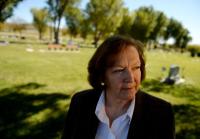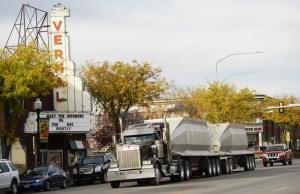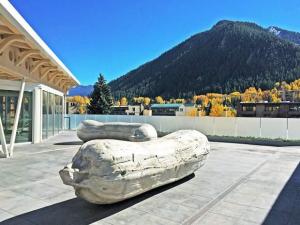Watch DPTV: Top stories with Molly Hughes
VERNAL, Utah — The smartphone-sized grave marker is nearly hidden in the grass at Rock Point Cemetery. The name printed on plastic-coated paper — Beau Murphy — has been worn away. Only the span of his life remains.
"June 18, 2013 - June 18, 2013"
For some reason, one that is not known and may never be, Beau and a dozen other infants died in this oil-booming basin last year. Was this spike a fluke? Bad luck? Or were these babies victims of air pollution fed by the nearly 12,000 oil and gas wells in one of the most energy-rich areas in the country?
Some scientists whose research focuses on the effect of certain drilling-related chemicals on fetal development believe there could be a link.
But just raising that possibility raises the ire of many who live in and around Vernal. Drilling has been an economic driver and part of the fabric of life here since the 1940s. And if all that energy development means the Uintah Basin has a particularly nasty problem with pollution, so be it, many residents say. Don't blame drilling for baby deaths that obituaries indicate were six times higher than the national average last year.
"People like to blame stuff on that all the time, but I don't feel like it has anything to do with oil and gas. I just feel like it's a trial I was given," said Heather Jensen, whose two infant sons are buried near Beau. One died in late 2011 and another early in 2013.
Questions about drilling's possible effect on infants and the unborn aren't confined to this northeast corner of Utah. Late in 2013, an unusually high number of fetal anomalies in Glenwood Springs, 175 miles away in Colorado, were reported to state authorities. A study found no connection with drilling.
Concerns have been raised in other areas of heavy drilling, but no clusters have been documented. No dots have been connected. But there are some in the scientific and medical communities working to try to make a connection.
"I suspect it is real — that there is a relationship," said Susan Nagel, Ph.D, a University of Missouri School of Medicine researcher who is focusing her studies on fracking-fluid chemicals that affect hormones.
Scads of medical studies have concluded that air pollution can harm embryos. Drilling is a documented contributor to that pollution. It is a given that some of the harmful chemicals released in drilling, like benzene, toluene and xylenes, can cross the placental barrier and cause heart, brain and spinal defects.
"Suffice it to say that air pollution from drilling is a part of it," Dr. Brian Moench said of the Vernal-area deaths.
Moench, a Salt Lake City-based anesthesiologist and president of Utah Physicians for a Healthy Environment, admits that establishing a scientifically solid link between dead babies and drilling pads is complicated.
Air pollution is often a stew of chemicals and particles from multiple sources. In Vernal, diesel pickups and fracking rigs roll down Main Street spewing fumes.
Oil field-support businesses, with their tanks of fluids and fuels, string out for miles. A coal-fired power plant sends a plume of smoke high in the air.
A recent National Oceanic and Atmospheric administration study showed dangerously high levels of ozone in the Uintah Basin around Vernal. Last winter, ozone levels spiked well beyond the safe level set by the Environmental Protection Agency — worse than the highest ozone days in Los Angeles. The study blamed the oil and gas industry.
"Decades of scientific research show that impaired air quality impacts human health, including fetal and infant health and survival," said Seth Lyman, an air-quality researcher with Utah State University in Vernal. "However, many other factors also impact infant survival, and it is extremely unlikely that poor air quality in Vernal is the primary cause of an infant mortality epidemic."
There was another factor last year: An explosion occurred east of Vernal on March 1, 2013, at a business that handles and cleans fracking equipment. The blast blew debris over a half-mile area. No one knows what it might have blown into the air. No measurements were taken.
Uintah County Commissioner Mike McKee said that wasn't a concern, just as drilling rigs aren't. He cited a county study done several years ago to determine if there was a spike in asthma cases in Vernal, as some residents feared. The study found there was not.
"People complaining about our air are from out of the area, from what I am seeing," McKee said.
One of the most vocal is Moench.
Moench took it seriously this year when Vernal midwife Donna Young told him that she had researched obituaries and was alarmed by the high numbers of dead babies.
Young and Moench were able to convince the TriCounty Health Department in Vernal to work with the state on a study to determine if Young's trend figures are correct.
Moench said that people who aren't looking at the possibility of a connection "have blinders on."
Nagel is in Moench's corner.
In two phases of research, she has gathered samples in Colorado's Garfield County and is currently exposing pregnant mice to fracking fluids in her lab. She will be looking for effects on the offspring.
Nagel said it is too early to have results, but she won't be surprised if there are effects from hormone-harming chemicals called "endocrine-disrupters."
"Mechanistically, from what we know about endocrine-disrupting chemicals, it is highly plausible," she said about linking the chemicals to fetal problems.
Part of the reluctance of residents around Vernal to ascribe any ill effects to energy-field pollution could be tied to the average $3,963 average monthly nonfarm wage in Uintah County — the highest in Utah.
Young said she benefits from that and has no bias against the industry in spite of receiving threats and suffering vandalism after she started talking about the infant deaths. Many of the fathers of the babies she delivers work in the oil fields.
"I just really, really want to find out what is going on," said Young, who now insists that all her pregnant patients use air and water filters.
It was midwives who also raised concerns and triggered the study in Garfield County this year. They had noticed a higher-than-normal number of anomalies in fetuses during ultrasounds and reported that to the Colorado Department of Public Health and Environment.
The study found no common denominator in 22 cases and determined the midwives may have erred in their use of ultrasounds and in record-keeping.
The Utah Department of Health is now working on a study. Epidemiologists initially are using birth and death certificates to determine if there truly was a spike in infant deaths, as Young's numbers show.
Her numbers show an upward four-year trend in infant deaths: One in every 95.5 burials in Uintah County in 2010 was a baby, according to Young. In 2011 it was one in every 53. In 2012, one in every 39.7. And in 2013 the number jumped to one in every 15.
State epidemiologist Sam LeFevre said his study will crunch numbers and not delve into causes for deaths unless the numbers show a potential problem.
Besides oil-and-gas-stoked pollution, there could be many other causes.
Uintah County is 24th of 27 Utah counties in health rankings.
Twice as many residents here smoke than in the rest of Utah. More residents, in an area rife with new fast-food chains, are overweight. More residents admit to drinking heavily. There are more teen mothers and more mothers on average who don't get good prenatal care.
Dr. Karl Breitenbach, a physician who has done deliveries and prenatal and newborn care in Vernal for 27 years, was the only Vernal physician who responded to requests for comment. He said he has reviewed data through 2012 and hasn't seen any increase in baby deaths.
"I am unwilling to speculate until I see some proof that there actually is an increased rate of infant morbidity or mortality," he said in an e-mail.
A mother bringing her arm-waving 9-month-old into a Vernal pediatrician's office for a well-child visit recently said she has no concerns about pollution and hadn't heard about the infant deaths.
"I have no worries," Jeni Taylor said.
While the state studies in Utah and Colorado address numbers, general research on fracking fluids and developing babies is expected to go farther.
Nagel said she is trying to establish a laboratory link that future researchers can then use as they study health effects in drilling areas.
Liza McKenzie, a research associate at the Colorado School of Public Health who has studied health effects of fracking fluids in Colorado, said she plans to do more research on the subject of fetuses and infants exposed to the chemicals.
Her earlier research showed babies born to mothers living within 10 miles of wells are at greater risk of congenital heart defects and neural tube defects. But some other researchers and the oil and gas industry have criticized her research methods and findings.
Results from the state study in Vernal are expected early next year.
For now, infant deaths have dropped back to average. Residents are reluctant to talk about the infant-death issue. Many are focusing on a future that is filled with expanded fossil-fuel prospects. Nearly 85 percent of Vernal residents indicated in a recent survey that they welcome oil shale development.
Commercial removal of oil from shale rock is expected to get underway next year. More than 25,000 new oil and gas wells are proposed in the basin. The first tar sands project in the United States is underway in Vernal's corner of Utah.
In Vernal, all that is translating into mushrooming amenities.
Finishing touches are being put on a sprawling new mall.
An energy-funded conference center with swooping modernistic glass walls is taking shape not far from an eye-popping community center.
A new library is a daytime magnet for mothers and kids.
And there are new babies to celebrate. Ben and Caren Moon, who previously lost a pre-term baby, just gave birth to a healthy new baby. They are feeling blessed even as they still grieve their earlier loss.
"Oil-field drilling has been here forever," Ben Moon said. "I don't believe it all had anything to do with that."
Nancy Lofholm: 970-256-1957, nlofholm@denverpost.com or twitter.com/nlofholm


 Font Resize
Font Resize





Article Comments